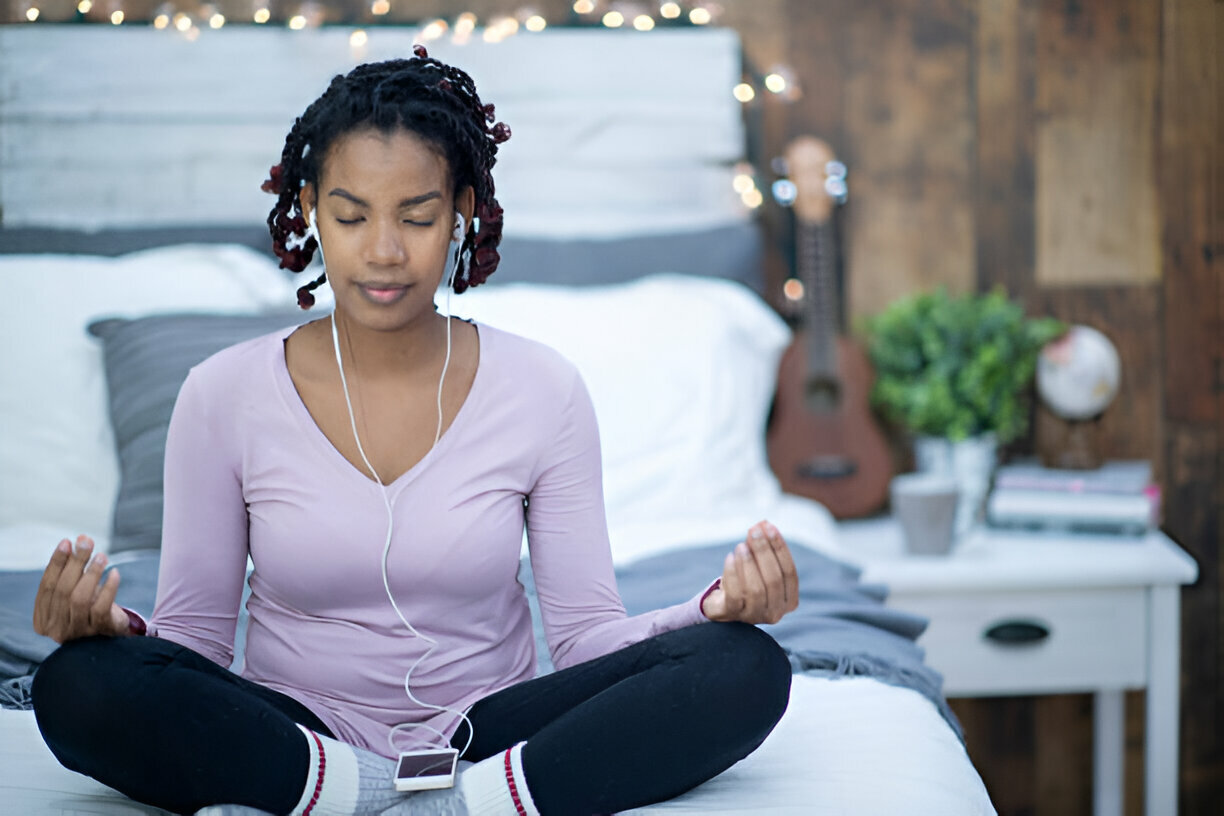Now Reading: Triumph Over Stress: Soulful Meditation for Women’s Verve in 2025
-
01
Triumph Over Stress: Soulful Meditation for Women’s Verve in 2025

Triumph Over Stress: Soulful Meditation for Women’s Verve in 2025
Juggling work, family, and societal expectations while riding the waves of hormonal shifts—sound familiar? In 2025, women are navigating more pressures than ever, with studies showing they’re twice as likely to experience anxiety compared to men. From caregiving roles to career demands, the mental load can feel overwhelming, often leaving little room for self-care. But here’s where meditation for women’s mental health is a game-changer.
More than just a relaxation tool, mindfulness empowers women to manage stress, balance emotions, and reclaim control over their mental health. Whether you’re a busy mom, a career-driven professional, or simply seeking inner peace, meditation offers practical, science-backed ways to thrive.
In this article, we’ll explore the unique mental health challenges women face, uncover how meditation fosters empowerment, and share five tailored mindfulness practices to help you feel stronger and more centered. Ready to prioritize your well-being? Let’s dive into the transformative power of meditation for women.
The Mental Health Challenges Women Face in 2025

Women in 2025 are under immense pressure, balancing multiple roles while facing unique mental health challenges. Many are primary caregivers, managing households or supporting aging parents, while also pursuing careers—often in workplaces where gender disparities persist. A 2024 WHO report highlights that women are 2.1 times more likely to experience anxiety disorders than men, driven by societal expectations to “do it all” without complaint. Hormonal fluctuations, from menstruation to menopause, can amplify stress, with 60% of women reporting mood swings tied to their cycles (recent surveys). Add in the constant comparison fueled by social media, and it’s no wonder 1 in 3 women report feeling overwhelmed weekly.
Traditional solutions like therapy or medication can help, but access isn’t always easy—cost, stigma, and time constraints often stand in the way. Women also face guilt over prioritizing self-care, with many feeling they must put others first. This is where meditation offers a lifeline. It’s accessible, affordable, and can be done in just a few minutes daily, fitting into even the busiest schedules. By addressing both emotional and physiological stress, mindfulness provides a holistic approach to women’s mental health, empowering them to navigate 2025’s challenges with resilience.
How Meditation for Women’s Mental Health Works
Meditation for women isn’t just about relaxation—it’s a powerful tool for empowering women’s mental health. Research shows that mindfulness reduces cortisol levels by up to 25%, helping women manage the stress of daily life, from work deadlines to family responsibilities. By focusing on the present moment, meditation fosters emotional regulation, which is crucial for women navigating hormonal changes or societal pressures. A 2024 study found that women who meditate regularly report a 30% improvement in mood stability, even during high-stress periods like menstruation or menopause.
Beyond stress relief, mindfulness boosts self-esteem and resilience. It encourages self-awareness, helping women recognize and challenge negative thought patterns—like the pressure to be “perfect.” This self-compassion empowers them to set boundaries and prioritize their well-being without guilt. Meditation for women also enhances focus, which is vital for women juggling multiple roles; studies show a 15% improvement in concentration after just two weeks of practice.
For women, empowerment through mindfulness means reclaiming control over their mental health. It’s a way to carve out space in a hectic world, fostering inner strength to face 2025’s challenges. Whether you’re seeking calm or confidence, meditation offers a path to thrive. Let’s explore five practices to get you started.
5 Mindfulness Practices for Women to Feel Empowered

Here are five mindfulness practices tailored for women, designed to fit into busy schedules and address their unique mental health needs. Each takes just 5-10 minutes, empowering you to feel stronger and more centered.
Practice 1: Morning Intention Setting Meditation
Start your day with a 5-minute intention-setting meditation. Sit quietly, close your eyes, and take deep breaths. Reflect on one empowering intention for the day—like “I will prioritize my needs” or “I am enough.” Visualize yourself embodying this intention as you move through your tasks. This practice sets a positive tone, helping you tackle challenges with clarity.
Practice 2: Body Scan for Hormonal Balance
Hormonal shifts can disrupt your emotional well-being. A 10-minute body scan meditation helps. Lie down or sit comfortably, and slowly focus on each part of your body, from toes to head. Notice sensations without judgment—tightness, warmth, or tension. Breathe into areas of discomfort, releasing stress. Studies show body scans reduce physical stress symptoms by 20%, promoting hormonal balance and calm.
Practice 3: Affirmation-Based Meditation
Combat self-doubt with a 5-minute affirmation meditation. Sit in a quiet space, breathe deeply, and repeat empowering affirmations like “I am strong,” “I am worthy,” or “I trust my journey.” Say each phrase three times, letting the words sink in. This practice boosts self-esteem, countering societal pressures to be “perfect.” It’s especially helpful during low-confidence moments, like after a tough day.
Practice 4: Mindful Walking for Busy Moms
For moms on the go, try a 5-minute mindful walking practice. While pushing a stroller or walking to pick up kids, focus on each step—feel your feet on the ground, notice your breath, and observe your surroundings (trees, sounds). If your mind wanders to your to-do list, gently bring it back. This practice grounds you, reducing overwhelm and helping you stay present for your family.
Practice 5: Evening Gratitude Reflection
End your day with a 5-minute gratitude reflection. Before bed, write or think about three things you’re grateful for—maybe a supportive friend, a small win at work, or a moment of peace. Reflect on how these moments made you feel. Gratitude boosts positivity, with research showing a 15% reduction in depressive symptoms. It’s a gentle way to unwind and feel empowered.
Building a Sustainable Meditation Routine for Women

Creating a meditation routine doesn’t have to be daunting, even with a packed schedule. Start small—5 minutes a day is enough to feel benefits like reduced stress and better emotional balance. Integrate mindfulness into existing habits, like meditating after your morning coffee or during a lunch break. For example, try the morning intention-setting practice while your tea brews.
Time scarcity and guilt over self-care are common barriers for women. Combat this by reframing meditation as a non-negotiable act of empowerment, not a luxury. Apps like Headspace offer women-focused sessions, such as “Stress Relief for Moms,” which you can do in short bursts. Set a daily reminder on your phone to stay consistent, and don’t stress if you miss a day—just pick it back up.
Community support can help, too. Join women’s wellness groups on X, like those under #WomensMentalHealth, to share tips and stay motivated. Local or virtual women’s circles often host mindfulness events, especially around International Women’s Day (March 2025). Building a routine is about progress, not perfection. Start with one practice from above, and visit our resources below to keep growing your mindfulness journey.
Resources and Tools for Women’s Mindfulness Journey
Ready to deepen your mindfulness practice? Apps like Headspace and Insight Timer offer women-focused meditations, including sessions for stress, sleep, and hormonal balance. Headspace has a “Women’s Wellness” collection, while Insight Timer features free guided practices led by female instructors.
Wearables like Fitbit can track stress levels and prompt guided breathing exercises, helping you stay consistent. If you prefer offline resources, books like The Power of Now by Eckhart Tolle offer mindfulness insights tailored for emotional resilience. For more guidance, our Meditation Page (#) provides videos, guides, and app recommendations specifically for women. Whether you’re a beginner or seasoned meditator, these tools empower you to prioritize your mental health. Start with one resource today, and take the first step toward lasting empowerment.
Meditation for women’s verve is a powerful ally for women’s mental health, offering empowerment, stress relief, and emotional balance in 2025’s demanding world. From morning intention setting to evening gratitude reflections, these mindfulness practices help women navigate societal pressures, hormonal shifts, and daily challenges with resilience. 5-10 minutes daily can transform your well-being, helping you feel stronger and more centered. Try one practice today—whether it’s a body scan for hormonal balance or mindful walking as a busy mom—and see the difference. You deserve to thrive—let mindfulness lead the way!





















